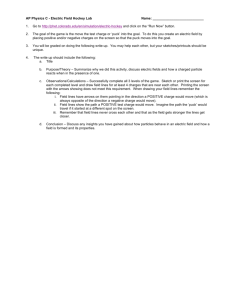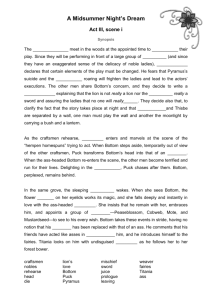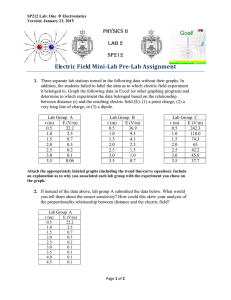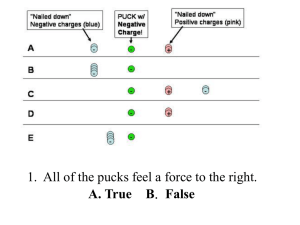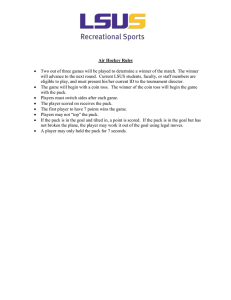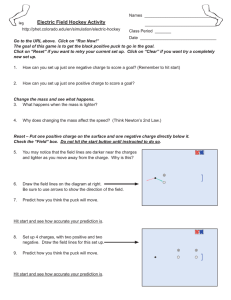1 English 129 Professor Laura Frost By submitting this essay, I attest
advertisement
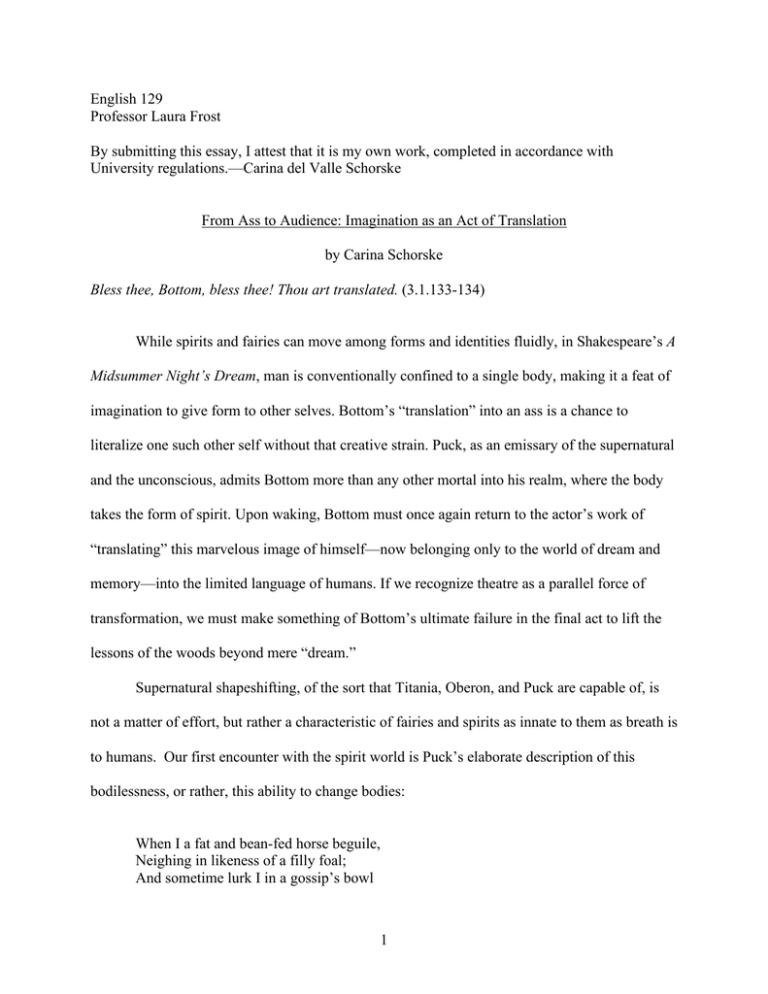
English 129 Professor Laura Frost By submitting this essay, I attest that it is my own work, completed in accordance with University regulations.—Carina del Valle Schorske From Ass to Audience: Imagination as an Act of Translation by Carina Schorske Bless thee, Bottom, bless thee! Thou art translated. (3.1.133-134) While spirits and fairies can move among forms and identities fluidly, in Shakespeare’s A Midsummer Night’s Dream, man is conventionally confined to a single body, making it a feat of imagination to give form to other selves. Bottom’s “translation” into an ass is a chance to literalize one such other self without that creative strain. Puck, as an emissary of the supernatural and the unconscious, admits Bottom more than any other mortal into his realm, where the body takes the form of spirit. Upon waking, Bottom must once again return to the actor’s work of “translating” this marvelous image of himself—now belonging only to the world of dream and memory—into the limited language of humans. If we recognize theatre as a parallel force of transformation, we must make something of Bottom’s ultimate failure in the final act to lift the lessons of the woods beyond mere “dream.” Supernatural shapeshifting, of the sort that Titania, Oberon, and Puck are capable of, is not a matter of effort, but rather a characteristic of fairies and spirits as innate to them as breath is to humans. Our first encounter with the spirit world is Puck’s elaborate description of this bodilessness, or rather, this ability to change bodies: When I a fat and bean-fed horse beguile, Neighing in likeness of a filly foal; And sometime lurk I in a gossip’s bowl 1 In very likeness of a roasted crab, And when she drinks, against her lips I bob And on her withered dewlap pour the ale. The wisest aunt, telling the saddest tale, Sometime for three-foot stool mistaketh me: Then slip I from her bum, down topples she… (2.1.46-53) This multiplicity of identity is his very form of self-identification; “Puck” or “Robin Goodfellow” is synonymous with foal, crab, stool, and any other entity, living or nonliving, that he might choose to inhabit. Neither do we have any reason to believe that Titania and Oberon are confined to particular bodies. Nowhere in the text are their human aspects ever mentioned except in that bewitched moment in which Titania whispers to the translated Bottom, “Sleep thou, and I will wind thee in my arms” (4.1.39). Even then Titania is decidedly “a spirit of no common rate,” not a woman in the form of woman (4.1.47). Because each form is only one of many, no single mode of being dominates or defines their sense of self. Fantasy is a literal reality for the spirits and requires no great transcendent impulse. This lack of challenge (the sort of challenge that humans experience constantly in their efforts to realize other identities for themselves) enables the spirits to act in many different spheres (Indian courts, wild woods, Athenian palaces) without the confining influences of either relegation to a single body or social suppression of multiplicity. The moment that Bottom’s physical body changes, becomes that of an ass, he is granted direct access to this pool of unmoored, archetypal imagery. The process by which he gains this access is described using only one word, no matter who speaks: Bottom has been “translated” (3.1.34)(3.2.32). Most texts annotate these lines and explain that “translated” is just another word for “transformed.” However, other readings seem possible in light of the play’s emphasis on language (especially its confusion and complexity in the theatre of the rude mechanicals). The word “translate” really implies no fundamental change; the word suggests that in another 2 language, “Bottom” means “ass.” This translation provides Bottom with another language to describe and understand himself, a language usually encrypted beyond human comprehension. Puck acknowledges the fact that Bottom’s translation is a direct replica of his own experience as a spirit when he says, “And forth my mimic comes” (3.2.19). Bottom’s episode as an ass is a brief mimicry of Puck’s constant shifting from “horse [to] hound [to] hog [to] bear [to] fire” (3.1.140). How is Bottom asinine in his human form as well, and why does Puck choose to reveal this form to Bottom, “the shallowest thickskin of that barren sort” (3.2.13)? The “sort” that Puck refers to here is Bottom’s troupe of “hempen homespuns,” or more significantly, actors (3.1.72). Despite their amateurish fumbling, this motley crew is making some attempt at transfiguring the self. They have shed their daytime identities as manual laborers in favor of “the palace wood, a mile without the town, by moonlight” (2.1.91). They have momentarily shunned society in favor of exploring different, darker realms. Playacting is the closest these men can get, imprisoned by poverty and class, to Puck’s profound creative freedom, and this kinship does not go unrecognized by the spirit world. Indeed, the word “shadow” refers to both “spirit” and “actor” in this play, drawing a distinct connection between the most and least powerful groups on stage (xlvii). And yet, Puck need not draw attention to their roughness for any audience to realize their inadequacy as actors. While they clearly find the idea of imagination seductive enough to pursue, they never fully grasp the nature of that idea, and their theatre suffers for it. They insist upon a sharp divide between “play” and “reality” and are constantly concerned that one will be mistaken for the other. Hence, they feel a comical need to explain those theatrical devices that are “acted,” that are not literal replications of reality. They must explain away all powerful elements— Pyramus’ violent death, the unabashed animalism of the lion—in a prologue that strips theatre of 3 its magic and the actors of their adopted identities: “tell them that I Pyramus am not Pyramus, but Bottom the weaver. This will put them out of fear,” and later, “‘If you think I come hither as a lion, it were pity of my life. No! I am no such thing. I am a man as other men are.’ And there, indeed, let him name his name and tell them plainly that he is Snug the joiner” (3.1.20)(3.2.3943). They do not allow the audience to make any imaginative leaps, to suspend the oppression of reality long enough to forget “man as other men are” and commune with man not as other men are, but as something larger and more extraordinary. The rude mechanicals too often emphasize “role” at the expense of “self.” Bottom, as the inventor of the prologue and the destroyer of theatrical magic, is indeed asinine. Too mulish to relinquish his identity as Bottom the Weaver and not brave enough to risk disturbing courtly complacency with passionate performance, he is a beast of burden for perpetuating Theseus’ dogma of “cool reason” (5.1.6). Puck apprehends both this failure (recall “the shallowest thickskin of that barren sort”) and the opportunity inherent in the attempt (3.2.13). In translating these psychologically asinine qualities into physical ones, Puck turns Bottom inside out, or brings the Bottom to the top. Puck allows the failed actor full access to his own unconscious and in this way tries to elicit the self-awareness necessary to powerful drama. He even exposes the rest of the rude mechanicals to Bottom in his translated state so that they too might glean some lesson from this image. Bottom takes Puck’s implied question and turns it right back around to his fellow actors: “What do you see? You see an ass head of your own, do you?” (3.1.111-112). Lines like that one, apparently out of character for Bottom, suggest a great depth of understanding buried beneath layers of folly and bravado. He is, after all, the speaker of that famous aphorism “reason and love keep little company together nowadays” (3.1.137-138). As an 4 ass, he has far more universal insight into the nature of things than he ever had as a man. Does Bottom carry this wisdom through to the other side of his “dream”? Left alone on the stage after the lovers have wandered back to the world of laws and marriage in a stupor, Bottom delivers a recognition speech that promises the audience a final “ballet of this dream,” an artistic translation of the inexplicable strangeness of man’s flipside (4.1.213). Incapable of articulating his alternate identity without the aid of art, he makes the subtle observation—lost on the courtly Athenians— that “man is but an ass if he go about to expound this dream” using his “wit” (4.1.204-205). Reason has little explanatory power in the dream world: despite Theseus’ long-winded condemnation of fantasy, he can provide no rational interpretation of what occurred in the woods. Bottom, conversely, seems to understand the “revelatory possibilities of the unconscious” and seeks to realize those possibilities in waking life (xlii). His instinct to use theatre as the translating tool between the unconscious and conscious mind, between the woods and the civilized world, between one idea of self and another, is both courageous and profound. Why, then, does theatre fail so miserably in the final act to open the doors of perception? Bottom’s ballet (his garbled word for “ballad”) falls on deaf ears, and not only because his rendition of Pyramus and Thisby regresses to the unimaginative blather of its beginnings. All of the lovers, in their anxiety to lock away the marvels of the woods, come to the theatre not to question and explore, but to pin down their doubts and make literal whatever is not so. Just before he agrees to pass the next hour listening to poetry, Theseus raves against the poet as a purveyor of lies, as one who “gives to airy nothing a local habitation and a name” (5.1.16-17). It is in this entirely hostile environment that the rude mechanicals must attempt to revive imagination and inspire a dialogue between actor and audience. As inept as Bottom and his 5 friends are as actors, the courtly lovers are more inept as an audience. Convinced that even “the best [actors] are but shadows, and the worst are no worse,” the lovers proceed to find all moments in the play that are not literally accurate, from the talking wall to the lantern as a symbol for the moon . They have worked themselves into such a critical frenzy by the end of the play that they quickly dismiss Bottom’s epilogue—which we know to be the recapitulation of the miracle in the woods—in favor of a mindless dance. No one ever hears “Bottom’s Dream”: it too is lost to the civilized world, the dust that Puck is sent “to sweep…behind the door” (5.1.382). The unimaginative actors can hardly be blamed for their failure as translators of fantasy. In a society where poets are lunatics and reason must explain away even the most complex of human experiences, any instinct beyond the codified structures of marriage and justice is a small triumph. As the “ultimate” audience, our sense of loss at not hearing Bottom’s ballad indicates the imaginative investment that we have made in the play as a whole. For us, the majority of what we will remember is what took place in the woods, in that darkness between law and order. If we look at the entire play as a series of inversions and redirections—beloved becomes unloved, man becomes animal, spirit becomes body—then we cannot escape the weight of the ultimate inversion that Puck poses. When Bottom’s translator breaks the wall between actor and audience to ask us to pass judgment on what we have witnessed, the real question is: having inhabited other selves for the past three hours with the aid of those other “shadows” belonging to your own world, can you translate this complicated perspective into the language of the everyday? Or must Bottom fail two audiences? 6 Works Cited Shakespeare, William. A Midsummer Night’s Dream. 1600. Ed. Russ McDonald. New York: Penguin, 2000. 7
